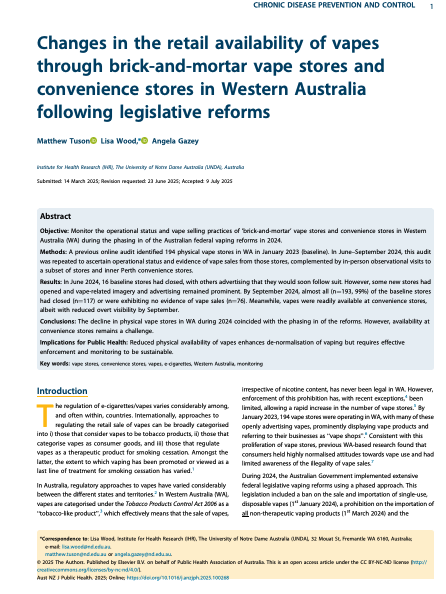Tobacco availability publications
Since 2012, we have been involved in research examining the geographic density and location of tobacco retail outlets in WA.
Vape stores in Western Australia: growth, proximity to schools and socio-economic gradient of density - Australian and New Zealand Journal of Public Health - Published 2024
This study replicated in previous research and was expanded to include vape stores.
Other research relating to tobacco retail environment:
Tobacco mythbusting—tobacco is not a major driver of foot traffic in low socio-economic small retail stores - Tobacco Control. Published 2021.
Current research
PharmaVape
There have been some significant changes over the last 2 years around the availablity and sale of vapes in Australia. PharmaVape is an action research collaborative study instigated by the University of Notre Dame Australia (UNDA) Home2Health team and Cancer Council Victoria and supported by Cancer Council WA.
The PharmaVape study is monitoring the availability of vapes through pharmacies in WA and nationally, and changes in this over time. It has ethics approval from the UNDA Human Research Ethics Committee.
The data collection is occurring across all states and territories of Australia and is being undertaken in waves. The first wave was completed in late September 2024, and examined at the availability of vapes in a sample of 286 pharmacies across the country prior to the Federal Therapeutic Goods and Other Legislation Amendment (Vaping Reforms) Bill 2024 taking effect on 1 October 2024. The second wave is occurring in November 2024, with the scheduling of further waves dependent on emerging findings. Variations by state/territory, socio-economic area differences, and type of pharmacy are being examined.
Home2Health Team has worked collaboratively with a number of organisations including Homeless Healthcare and Cancer Council WA to address high rates of tobacco consumption amongst people experiencing homelessness.
Community Service Organisations’ Knowledge, Attitudes, and Current Practices Relating to E-Cigarette and Tobacco Use
While Australia has seen substantial reductions in tobacco smoking prevalence in the general community over the last three decades, this decline has largely not extended to more vulnerable or disadvantaged population groups. People experiencing homelessness, and those living with alcohol and/or drug dependence, mental health issues, and/or who have had contact with the justice system have smoking rates much higher than that of the general Australian population. In addition to the more widespread and normalised use of tobacco products, these population groups face additional barriers to cessation. The very nature of the types of services provided in this sector means that clients often are dealing with difficult circumstances in other areas of their life hence tobacco is not, or often not, perceived as a high priority issue. The extent to which e-cigarettes have been taken up by people from vulnerable population groups is not well understood, and there is a paucity of research on the attitudes and current practices of community and social service organisations in relation to e-cigarettes.






